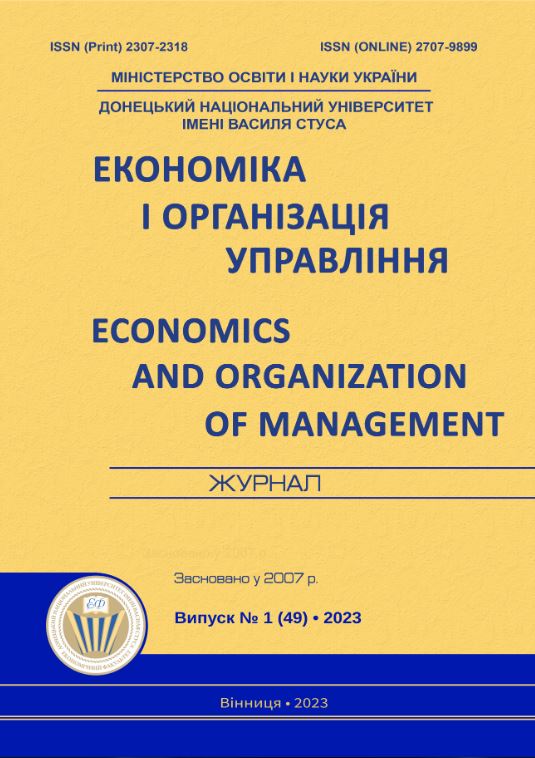Challenges for anti-crisis management of companies in the conditions of post-war recovery
DOI:
https://doi.org/10.31558/2307-2318.2023.1.11Keywords:
anti-crisis management; war; digitization; labor market; post-war recoveryAbstract
The work analyzes the methods of anti-crisis management and their application at enterprises in the conditions of post-war recovery. The author emphasizes that in the practice of anti-crisis management, some business owners believe that such a management strategy should be implemented after the onset of the crisis itself. Extraordinary (force majeure) circumstances - external or internal - force management to make immediate decisions. Management in a crisis situation can be defined as the process of working under the pressure of circumstances in a way that will allow managers to analyze, plan, organize, direct and control a number of interdependent operations while making quick and rational decisions on urgent problems facing the company.
Criteria for assessing the effectiveness of anti-crisis management are given in the paper. The author claims that the main factors of changes in the world are technological progress, globalization, climate changes, which affect economic, political and social transformations, and therefore the labor market. These factors also affect economic changes in Ukraine, but the most significant factor of changes in Ukraine today is the war. Due to the full-scale invasion of Russia in Ukraine, trends in the labor market and trends of the future of work are changing at an accelerated pace, so the company needs to understand the trends and trends dictated by the present more than ever in order to be ready to face challenges and develop. The current state of Ukrainian enterprises was also discussed in detail in the article. As a result, it was concluded that one of the main recommendations for the application of anti-crisis management methods of enterprises in the conditions of post-war recovery is the assessment of the impact of work transformation on the current environment. Employers should update their anti-crisis management strategy in order to respond more quickly and efficiently to the challenges that arise, and be ready to adapt - to develop a strategy for solving these problems in the most economically beneficial way.
References
Стешенко О. Д., Масалигіна В. В. Антикризове управління в умовах пандемії. Вісник економіки транспорту і промисловості. 2020. № 70–71. С. 75–82.
Лігоненко Л. О. Антикризове управління підприємством в умовах економіки знань та інтелектуалізації менеджменту. Економічний форум. 2016. № 1. С. 161–170.
Гудзь О. Є. Формування стратегії антикризового управління підприємств. Економіка. Менеджмент. Бізнес. 2019. № 2. С. 4–10.
Москвін Б. Банкрутство як механізм антикризового управління підприємством. Вісник КНТЕУ. 2020. № 2. С. 58–68.
Тимошенко М. В., Петров В. А. Ідентифікація ризиків та особливості антикризового управління в умовах війни. Під¬приємництво і торгівля: тенденції розвитку : матеріали 5-ої міжнар. наук.-практ. конф., м. Одеса : Державний університет «Одеська політехніка», 2022. С. 52–54.
Єпіфанова І., Болотнов Д. Місце стратегії в системі антикризового управління підприємствами. Вісник Хмельницького національного університету. 2022. № 3. С. 335–338.
Марачевська А. Практична цінність антикризового управління підприємством у воєнний та післявоєнний час в Україні. SWorldJournal. 2022. № 13-02. С. 8–13.
Ковалевська А. В. Конспект лекцій з дисципліни «Антикризове управління підприємством». Харків. нац. ун-т міськ. госп-ва ім. О. М. Бекетова. – Харків : ХНУМГ ім. О. М. Бекетова, 2016. – 140 с.
Нікітін А. А. Збройний конфлікт як вид воєнного конфлікту. Науковий вісник Львівського державного університету внутрішніх справ. 2018. № 2. С. 52–59.
Ватченко Б. С., Шаранов, Р. С. «Антикризове управління підприємством в умовах війни». № 182 (2022): Економічний простір 38-43. https://doi.org/10.32782/2224-6282/182-5
https://www.epravda.com.ua/publications/2022/03/23/684549/
https://careerhub.in.ua/trendi-ta-rekomendacii-shhodo-roboti-ma/

